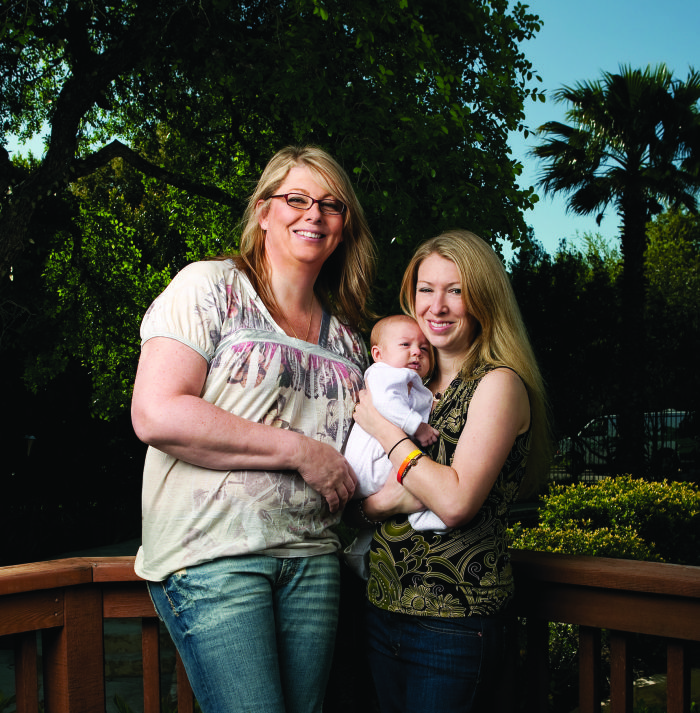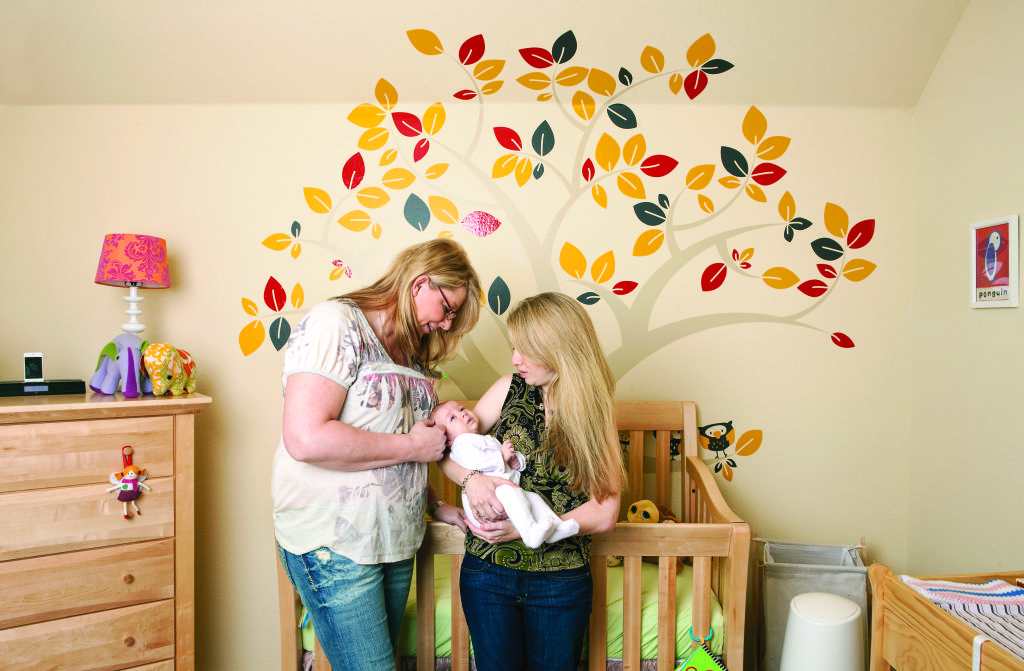There was a point in Meghan Stabler’s life when she decided that being alive was not worth it. The feelings that she had struggled with since the age of five were simply too much to bear. She didn’t write a note; it felt very logical at the time. Why should her family and friends bear the burden of her secret? Late one evening she knew suicide was her only out.
Sitting in her truck, in a darkened parking lot with gun in hand gave Stabler, who was born a male and lived as one throughout her thirties, both time to contemplate her life and also the strength to complete transition. “That was an indication that if I’m feeling this way, there were others, and I should do my best to help them and also transition to my true self,” she said.
Hitting that low point helped to prompt what became a defining journey in Stabler’s life: coming to terms with the fact that she was born in the wrong body. Our culture assigns much meaning based on gender, and many people have struggled with their gender identity throughout history. However, only recently has the topic of transsexuality come to the forefront of our cultural discourse in a meaningful way.
Even so, observing Stabler and her partner of seven years, Erin Abernathy, with their sweet little daughter, Edie Francesca, and how blissfully happy they are, the most remarkable thing is how unremarkable they are. They are just two caring women doting on their daughter, snapping pictures of her every smile and rocking her to sleep. One would never imagine their tumultuous journey. Motherhood suits Stabler, and she’s reveling in the small joyous moments. “The nurturing is the best part of being a mom.” she said. “Having someone depend on you, so at this stage—the diaper needs to be changed, she needs to be fed—for me, it’s just awesome.”
Over a boisterous lunch downtown, Stabler displayed a wry sense of humor and a good-natured attitude about the ups and downs in her life, often using analogies to make her points about social justice, the meaning of family and her passion for full LGBT equality.
Growing up in England, Stabler prayed every night for three things to happen: that she’d wake up as a girl, that all of her clothes would be different, and that her parents would still love her. From the age of five, she knew something was different about her. She recalled seeing an article in The Sun, headlined “Sex Change Tennis Player” when she was 10. It was about Renée Richards, a former tennis player who had sex reassignment surgery in 1975. When she read the description, she identified with it.
For someone who is transsexual—whose gender identity is inconsistent with the birth gender—the fear of revelation is that he or she will lose job, income, family and friends. Statistics indicate that transgender people are much more likely to be unemployed or to suffer from workplace discrimination than the general population. This is in addition to the considerable physical transformation of the body with hormone treatments and multiple surgeries.
Stabler had consistently focused all of her energy into her job as a high-powered senior vice president at a software firm, frequently jetting around the globe to places like France, Argentina, Japan and Singapore for business meetings. The nonstop work ethic enabled her to hide from reality and protect herself. “I didn’t have the time to think about the true me or let anyone see the true me,” she said. “I knew that as soon as they did, they would see a chink in my armor.”
A male executive in the workplace is generally seen as the so-called alpha dog: When he goes into a meeting, he’s expected to lead it. Stabler, who transitioned in the workplace, observed our society’s gender stereotypes in many ways. “When I started going to meetings where people didn’t know my history, it was interesting to see that as a woman you’re put down. As a woman, I could see that our input and thinking wasn’t as equally considered,” she said. “If you did try and stand up as a woman, there was always a feeling—you’re not seen as the alpha dog anymore, but you’re seen more as a note taker, or someone to follow direction.”
Needless to say, transitioning from one gender to another is not something that anyone takes lightly. Stabler, who’d been thinking about it for decades, found a great therapist and developed a very strategic plan for revealing her truth to her professional peers. She described it as a game of chess, always having to think several steps and potential outcomes in advance.
One outcome she could not have predicted—she truly doubted whether she would ever be loved again—was meeting the woman who became her partner. She met Abernathy at her company when she was a new sales representative and Stabler was speaking to the class of new hires.
“Erin had never been with anyone who transitioned before, but she was a lesbian,” said Stabler. “That’s the interesting thing; she was attracted to me the person—my quirkiness, dry British humor—she saw me. I don’t know how to explain it. She’s only attracted to women, but she fell in love with me.” Although Stabler is someone who eschews labels in general, she was happy to admit the joy that her lesbian relationship has brought her.
“We laugh a lot, we make fun of each other,” said Abernathy, who is now a full-time stay-at-home mom. “We have a mutual respect for each other, and we’re always reminding each other of our love.”
Although they didn’t connect right away, Abernathy and Stabler eventually met in Houston over coffee and talked for hours. Walking out of the parking lot, Abernathy was going to drive back home to Dallas when Stabler gave her a kiss on the cheek. “At that point, I knew that this was just the spirit that I wanted to be around,” Stabler said.
“L Style G Style put us on the baby direction,” Stabler said. “We read your article on Debbie [DeBerry] and Marianne [DeLeon]. I’m a little bit older than Erin, and we had talked about having children but hadn’t given it much thought.” A few months after the article was published (May 2010), they ran into DeBerry and DeLeon on South Congress Avenue with their baby boy and chatted for 30 minutes. “We walked away from that knowing that we wanted to have a baby.”
After searching diligently for many months, they chose a suitable donor through their network of friends, and Abernathy gave birth to a beautiful little girl, Edie, on December 30 last year. Abernathy said that they were lucky to find a donor and a very LGBT-friendly staff at St. David’s Hospital in North Austin. Since giving birth, she added, the challenge has been getting sleep and still finding time for each other as a couple.
“It’s a joy watching her grow,” she continued. “As each week passes, she seems more aware of us, herself and her surroundings. Watching her smile, listening to her coo and even hearing her new scream that she’s trying out is a joy.”
One might think that it was easy for Stabler to come out, since her family was 5,500 miles away in England, but it was very difficult. She knew that if she talked to her sister first and was accepted, that she would have an advocate on her behalf with her mother. Stabler spent weeks writing a deep personal letter, flew to England, and gave it to her sister. While she was reading it, Stabler went into the other room.
The recollection of it, many years later, brought tears to Stabler’s eyes. “She comes out, looks at me, gives me a hug and says, “I’m sad that I’m losing a brother, but I’m so happy I’m gaining a sister.” A few months later, she went back for a visit while in the midst of hormone treatments and told her mother. Although it was initially tough, the two now speak several times a week, and her mother loves the family that Stabler has created.
Prior to transitioning, Stabler had fathered a daughter during her previous marriage. Although that relationship ended in divorce, Stabler has a good relationship with her daughter Hannah, now 18. Despite the geographic distance—she went to live overseas with her mother when her parents divorced—she is supportive and has even attended local LGBT civil rights events.
In the coming out process, those who seem the least likely to be supportive can surprise you. From a coworker, she received an email that began, “I’m a devout Roman Catholic,” but which went on to document a gradual increasing acceptance for her. Although the coworker didn’t presume to understand all of the issues, his email ended with, “I really want to know what I can do to support you and your community.”
The uniqueness of Stabler’s own experiences has helped to fuel her longtime activism, which began in the 1980s during the height of the HIV/AIDS epidemic. In 2007, when the Employment Non-Discrimination Act was before Congress, a split among LGBT equality organizations caused division within the Human Rights Campaign, the country’s largest civil rights organization. The main point of the disagreement was whether to include gender identity along with sexual orientation in the bill. Stabler, ever the pragmatic business executive, saw it as a great opportunity to prompt change.
“It’s a great group of people. Yet some said, ‘They don’t care about trans people,’” said Stabler, who currently serves on the HRC’s national board of directors, setting the strategy for the civil rights behemoth. “The amount of conversations I’m in where it’s clear that they do—oh, my gosh.”
She talked with then-HRC President Joe Solmonese about the HRC’s Business Council, which worked with companies to get 100 percent ratings on the group’s Corporate Equality Index. At that point, Stabler was not known nationally. She was simply a transsexual person with considerable business experience. That conversation led to her serving on the Austin and Houston steering committees, co-chairing several Gala Dinners, being invited to speak at the national dinner in Washington, D.C., and submitting testimony before Congress.
Dozens of speeches, legislative testimony and political meetings later, Stabler easily listed the most moving moments in her lifetime of public speaking and activism. When she gave the keynote speech at Reaching OUT MBA, a nonprofit organization for lesbian, gay, bisexual, and transgender graduate business school students, Stabler brought the crowd to tears as she recounted the stories of Asher Brown, Tyler Clementi, and other young LGBT people who committed suicide in recent years.
In February of this year, while discussing politics with Vermont Govenor Peter Shumlin and N.Y. State Senator Tom Duane at the HRC Gala Dinner in New York, a friend told her that a middle-aged straight couple, who turned out to be Tyler Clementi’s parents, wanted to meet her. “I about lost it. I’m standing there. I just couldn’t say a word. It felt like an eternity and then I just looked at them and I said, ‘Could I give you a hug?’ Jane Clementi said, ‘I really would like that.’” They hugged for five minutes.
“I want to give a voice to those who don’t have a voice,” she said. “I’m pissed off that we don’t have equality. Why should the LGBT community be treated as second-class and not have the same rights as ‘straight’ America? I’ll continue to fight for the bending arc of equality, every day.”
Looking back on her journey, Stabler is clear-eyed and strong in her belief. “It’s worth it to live authentically and be who you truly are.”





































